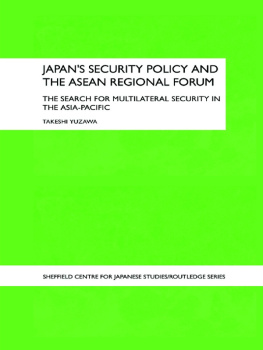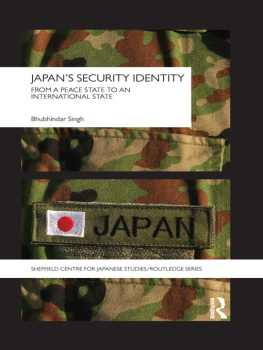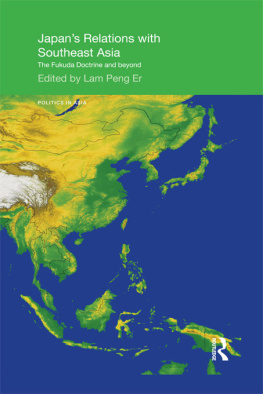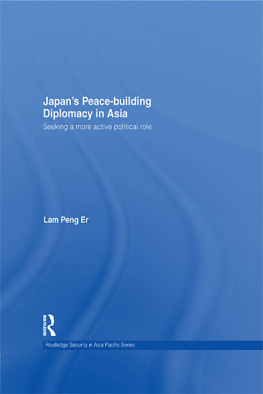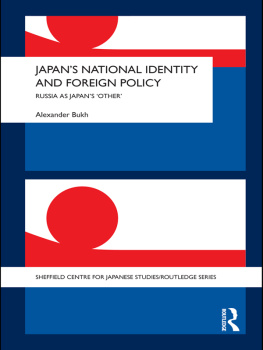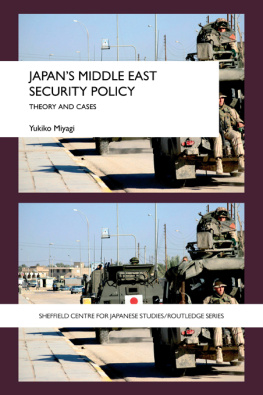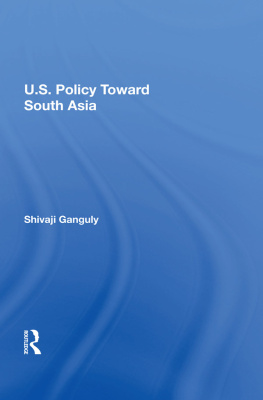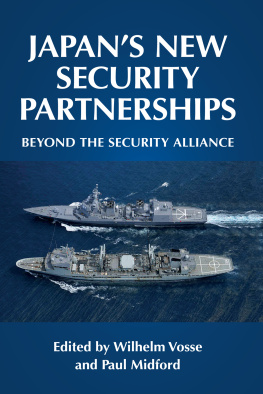
Japans Asia policy
From the end of the Second World War to the end of the Cold War Japan had little room for manoeuvre in terms of conducting its foreign policy because of its close association with the United States. Beneath the surface, however, Japan sought to develop an independent policy towards Asia. In the 1990s it can no longer count on the Cold War structures to provide the frame of reference for its foreign policy.
Wolf Mendl explains the historical roots of Japans foreign policy, especially the Asia-versus-the-West debate. The book provides a readable and up-to-date analysis of Japans relations with the countries of North-East and South-East Asia. It also makes comparisons with the policies of powers of equal status in the post-war world. Various policy options are discussed as well as the determinants and characteristics which are likely to govern the conduct of Japans external relations.
The book underlines the importance of the international environment in shaping the direction of Japans foreign policy. It has become part of the Japanese tradition in the post-war era to steer the ship of state with the view to keeping open as many options as possible and adjusting to circumstances as they arise.
Wolf Mendl is Emeritus Reader in War Studies at the University of London. He is also an Associate Fellow of the Asia-Pacific Programme of the Royal Institute of International Affairs.
Politics in Asia
Edited by Michael Leifer
London School of Economics and Political Science
ASEAN and the Security of South-East Asia
Michael Leifer
Chinas Policy Towards Territorial Disputes
The Case of the South China Sea Islands
Chi-kin Lo
India and Southeast Asia
Indian Perceptions and Policies Mohammed Ayoob
Gorbachev and Southeast Asia
Leszek Buszynski
Indonesian Politics under Suharto
Order, Development and Pressure for Change Michael R.J.Vatikiotis
The State and Ethnic Politics in Southeast Asia
David Brown
The Politics of Nation Building and Citizenship in Singapore
Michael Hill and Lian Kwen Fee
Politics in Indonesia
Democracy, Islam and the Ideology of Tolerance Douglas E.Ramage
Communitarian Ideology and Democracy in Singapore
Beng-Huat Chua
The Challenge of Democracy in Nepal
Louise Brown
Japans Asia Policy
Regional Security and Global Interests Wolf Mendl
The International Politics of Asia-Pacific 19451995
Michael Yahuda
Political Change in Southeast Asia
Trimming the Banyan Tree Michael R.J.Vatikiotis
Hong Kong
Chinas Challenge Michael Yahuda
Korea versus Korea
A Case of Contested Legitimacy B.K.Gills
Managing Political Change in Singapore
The Elected Presidency
Edited by Kevin Y.L.Tan and Lam Peng Er
First published 1995
by Routledge
11 New Fetter Lane, London EC4P 4EE
This edition published in the Taylor & Francis e-Library, 2005.
To purchase your own copy of this or any of Taylor & Francis or Routledges collection of thousands of eBooks please go to www.eBookstore.tandf.co.uk.
Simultaneously published in the USA and Canada
by Routledge
29 West 35th Street, New York, NY 10001
First published in paperback in 1997
1995 Wolf Mendl
All rights reserved. No part of this book may be reprinted or reproduced or utilized in any form or by any electronic, mechanical, or other means, now known or hereafter invented, including photocopying and recording, or in any information storage or retrieval system, without permission in writing from the publishers.
British Library Cataloguing in Publication Data
A catalogue record for this book is available from the British Library
Library of Congress Cataloguing in Publication Data
A catalogue record for this book is available from the Library of Congress
ISBN 0-203-03311-6 Master e-book ISBN
ISBN 0-203-16167-X (Adobe eReader Format)
ISBN 0-415-09648-0 (hbk)
ISBN 0-415-16466-4 (pbk)
Foreword
In the wake of its defeat in the Pacific War, the succeeding Cold War provided the frame of reference for Japans conduct of foreign policy and for its remarkable economic recovery and achievement. A half a century later in a very different strategic environment and in a revised relationship with its American victor and mentor, Japan has become one of the three major Asia-Pacific powers with an evident aspiration to assume a global role. That aspiration has been registered in a request to occupy a permanent seat on the United Nations Security Council. The legacy of the Pacific War persists, however, in Japans reluctance to make the kind of conventional contribution to international peace and security required under Article 23 of the United Nations Charter. One reason for such reluctance is the knowledge that the kind of contribution required would not be welcomed within the Asian region which Japan once dominated.
In the preface to this paperback edition, Dr Mendl has noted and reflected on significant developments within Japan and in its intra-Asian relations since the manuscript for the hardback went to press. That intervening period has been one of some drama, both within Japan and in its external relations as the country has come into contention with South Korea and China over maritime jurisdiction in East Asia. Less dramatic but more constructive has been Japans role within the ASEAN Regional Forum (ARF); the multilateral security dialogue which began its working life in July 1994. That role reflects a strong strain of continuity in Japans Asia policy whereby the military dimension of security has been addressed through sustaining a long-standing relationship with the United States, while complementary cooperative security ties have been sought with regional states. The ARF represents one pillar of that complementary strategy, but the more fundamental one is the relationship with the United States which was renewed by Prime Minister Hashimoto and President Clinton in Tokyo in April 1996. Dr Mendls scholarly analysis addresses and illuminates those complementary dimensions of Japans Asia policy as well as the problems of reconciling a complex Asia policy with the pursuit of global interests in uncharted post-Cold War waters.
Michael Leifer
Preface and acknowledgements
This book analyses Japanese policy in its Asian and global contexts and ends with a discussion of Japans options in the current state of flux in world affairs. When I first set foot in the country in February 1955, my knowledge of it was sufficient to fill the back of the proverbial postage stamp. It had only just emerged from the isolation of post-war occupation and was largely unknown in Europe. Today, Japan has a truly global presence and cannot be ignored. A great deal of scholarly attention has been devoted to the phenomenal rise from the ashes of war and defeat, but that is not the purpose of this study. Instead, my main objective is to discuss the present state of Japans relations with its Asian neighbours and how they are linked to its interests and policies as a global economic power.
To talk of a countrys foreign policy is to beg a difficult question: how can any large conglomeration of people and sectional interest groups have


